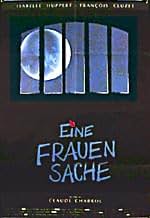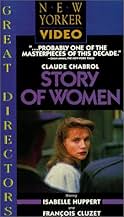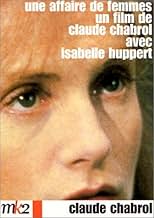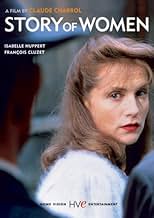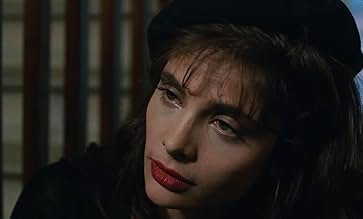Une affaire de femmes
- 1988
- Tous publics
- 1h 48m
IMDb RATING
7.5/10
6.2K
YOUR RATING
A housewife in Nazi-occupied France struggles to make ends meet when her husband returns home after being wounded in the war.A housewife in Nazi-occupied France struggles to make ends meet when her husband returns home after being wounded in the war.A housewife in Nazi-occupied France struggles to make ends meet when her husband returns home after being wounded in the war.
- Awards
- 14 wins & 8 nominations total
Featured reviews
Claude Chabrol's "Une affaire de femmes" takes us back to the challenging times of World War II, exploring the life of Marie, portrayed with depth and complexity by Isabelle Huppert. Set against the backdrop of a war-torn France, the film delves into the moral intricacies of survival, collaboration, and the consequences of one woman's choices.
The narrative unfolds as Marie, left alone with her two children during the wartime, faces the grim reality of a defeated nation. Huppert's performance brings a nuanced portrayal of Marie as she navigates through a tumultuous period, discovering her unexpected skill in performing abortions, a secret source of income during these dire times.
The film refrains from passing moral judgment on Marie's actions, leaving room for the audience to grapple with the ethical complexities of her decisions. François Cluzet complements Huppert's portrayal with his role as Marie's husband, whose jealousy and actions set the stage for the unfolding tragedy.
Chabrol, a master of suspense and a seasoned storyteller, weaves a narrative that transcends the specifics of its wartime setting. The movie serves as a poignant commentary on the broader themes of collaboration, morality, and the resilience of the human spirit in the face of adversity.
"Une affaire de femmes" captures the essence of Claude Chabrol's ability to dissect societal norms and individual choices. The film, although set against the backdrop of WWII, resonates with timeless themes, leaving the audience with much to contemplate. Huppert's compelling performance, supported by a strong cast, makes this film a standout in Chabrol's body of work.
The narrative unfolds as Marie, left alone with her two children during the wartime, faces the grim reality of a defeated nation. Huppert's performance brings a nuanced portrayal of Marie as she navigates through a tumultuous period, discovering her unexpected skill in performing abortions, a secret source of income during these dire times.
The film refrains from passing moral judgment on Marie's actions, leaving room for the audience to grapple with the ethical complexities of her decisions. François Cluzet complements Huppert's portrayal with his role as Marie's husband, whose jealousy and actions set the stage for the unfolding tragedy.
Chabrol, a master of suspense and a seasoned storyteller, weaves a narrative that transcends the specifics of its wartime setting. The movie serves as a poignant commentary on the broader themes of collaboration, morality, and the resilience of the human spirit in the face of adversity.
"Une affaire de femmes" captures the essence of Claude Chabrol's ability to dissect societal norms and individual choices. The film, although set against the backdrop of WWII, resonates with timeless themes, leaving the audience with much to contemplate. Huppert's compelling performance, supported by a strong cast, makes this film a standout in Chabrol's body of work.
Marie (Isabelle Huppert) helps women have abortions in Nazi-occupied France, which turns out to be an unexpected income. However, she was arrested and sentenced to death by the time's reactionary government, looking for public examples to give to the nation.
Marie Latour (in reality her real name was Marie-Louise Giraud), was the last woman to be guillotined in France. The film tells this tragic story with dry realism, both in terms of the dialogues and the era's accurate reconstruction.
The film was in competion at the Italian 1988 Venice Film Festival. Isabelle Huppert won the Coppa Volpi award for best female interpretation, while outside conservative Catholic associations clamoured for the film to be withdrawn from distribution, for Marie's desperate prayer before being beheaded, accused by them fanatic groups to be 'blasphemous'. The film was released anyway.
Marie Latour (in reality her real name was Marie-Louise Giraud), was the last woman to be guillotined in France. The film tells this tragic story with dry realism, both in terms of the dialogues and the era's accurate reconstruction.
The film was in competion at the Italian 1988 Venice Film Festival. Isabelle Huppert won the Coppa Volpi award for best female interpretation, while outside conservative Catholic associations clamoured for the film to be withdrawn from distribution, for Marie's desperate prayer before being beheaded, accused by them fanatic groups to be 'blasphemous'. The film was released anyway.
I'd like to focus on this film as a French film, not of the United States. If one has seen "La Chagrin et la Pitie," then one knows the legacy of this film. France was not perfect during WWII. Not everyone in France was part of the resistance, mainly, they were trying to survive. I think its an amazing film that sheds light on a crucial point in French history. Yes, it's about abortion and Chabrol does a great job ensuring his abortionist is less than perfect. That's a wonderful point he makes, that no one is perfect, not even the moral majority of the government. But, I come away from this film with the same questions that I get from "Lacombe, Lucien," which are: 'what would I have done?' And, please, don't Monday morning quarterback World War II.
Definitely one of director Claude Chabrol's best films, if not his best.
It is based upon a true story out of Nazi occupied France, and stars the incredible Isabelle Huppert (The Piano Teacher, 8 Women). She is supported by Marie Trintignant (Harrison's Flowers), who had her career cut short by an untimely death.
Huppert finds a way to feed her family. She performs abortions and rents out rooms to prostitutes. Everything seems to be going well for her, but her husband is not happy about the fact that he hasn't had any in 10 years, and she now has a lover - he turns her in.
France is now rid of the Germans and is trying to restore her morality. Unfortunately, Marie to be made an example.
Huppert was great, and Trintigant was also very good.
It is based upon a true story out of Nazi occupied France, and stars the incredible Isabelle Huppert (The Piano Teacher, 8 Women). She is supported by Marie Trintignant (Harrison's Flowers), who had her career cut short by an untimely death.
Huppert finds a way to feed her family. She performs abortions and rents out rooms to prostitutes. Everything seems to be going well for her, but her husband is not happy about the fact that he hasn't had any in 10 years, and she now has a lover - he turns her in.
France is now rid of the Germans and is trying to restore her morality. Unfortunately, Marie to be made an example.
Huppert was great, and Trintigant was also very good.
This is a true story and the heroine is not unlike Louis Malle's hero "Lacombe Lucien".They are too coarse,too immature to realize what they are doing.Lucien could have opted for the Resistance,but he's deemed too stupid by the schoolteacher and he winds up in Collaboration.Chabrol's heroine only wants to "help" her neighbors before she realizes she can earn a lot of dough with abortion.Chabrol watches his character as an entomologist,as she makes her way through those troubled times:the world has gone mad,and anyway is abortion worse than what the authorities are doing with the Jews ?Maréchal Petain's France was so humiliated that it tried to make up with it by focusing on "morality".
The heroine could make also think of Violette Nozières,another Chabrol movie which also featured Huppert.And she's also akin to Sandrine Bonnaire's character in "la cérémonie".All are women overtaken by events,all are victims of a well-meaning society,Chabrol's trademark. "Une affaire de femmes" is certainly a good work although it lacks the sweep and the directing innovations of his late sixties/early seventies classics.
The heroine could make also think of Violette Nozières,another Chabrol movie which also featured Huppert.And she's also akin to Sandrine Bonnaire's character in "la cérémonie".All are women overtaken by events,all are victims of a well-meaning society,Chabrol's trademark. "Une affaire de femmes" is certainly a good work although it lacks the sweep and the directing innovations of his late sixties/early seventies classics.
Did you know
- TriviaBased upon the true story of Marie-Louise Giraud, with character names changed.
- SoundtracksLe Poème de l'Amour et de la Mer
Written by Ernest Chausson
- How long is Story of Women?Powered by Alexa
Details
- Release date
- Country of origin
- Official site
- Languages
- Also known as
- Story of Women
- Filming locations
- Coulommiers, Seine-et-Marne, France(interiors: women's prison)
- Production companies
- See more company credits at IMDbPro
Box office
- Gross US & Canada
- $438,483
- Runtime
- 1h 48m(108 min)
- Sound mix
- Aspect ratio
- 1.66 : 1
Contribute to this page
Suggest an edit or add missing content


